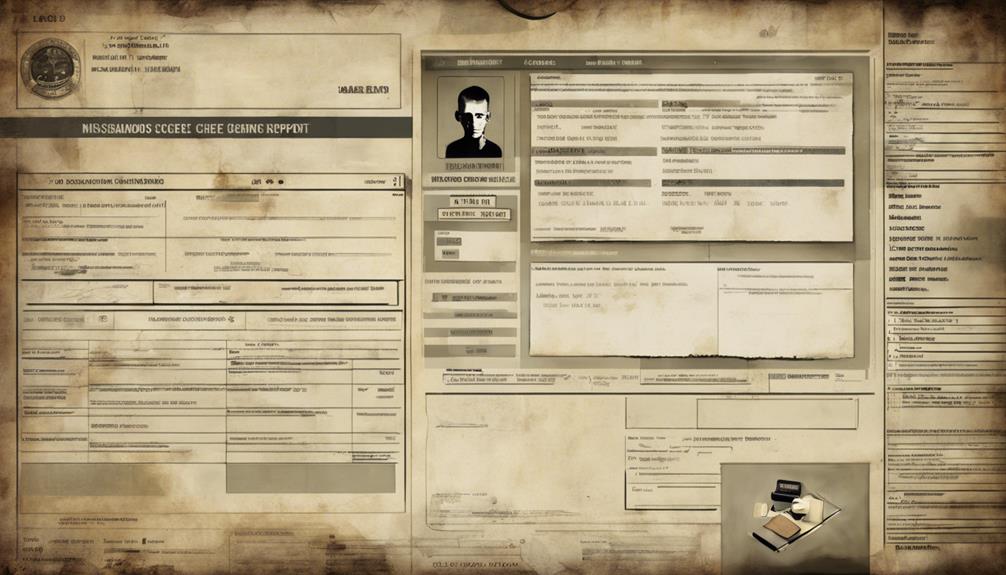Yes, misdemeanors can be visible on background checks, affecting job opportunities. Employers often scrutinize these less significant offenses during pre-employment screenings. The nature and recency of the misdemeanor, as well as its relevance to the job, can impact hiring decisions. Various types of checks incorporate misdemeanors, with state laws influencing disclosure. Transparency about misdemeanors is essential to avoid negative repercussions in the hiring process. Understanding state regulations and potential for expungement can help individuals navigate these challenges effectively.
Key Takeaways
- Misdemeanors can appear on background checks.
- Visibility depends on the type of background check.
- State laws influence misdemeanor disclosure.
- Employers consider relevance to job responsibilities.
- Misdemeanors impact job opportunities.
Misdemeanors on Employment Background Checks

Employers commonly include misdemeanor checks in their pre-employment screening processes to assess candidates' criminal backgrounds. Misdemeanors, which are considered less severe offenses than felonies, can still show up on various types of background checks conducted by employers. These checks are an essential part of evaluating a candidate's suitability for a particular job. Alongside other criminal records, misdemeanors are typically scrutinized during pre-employment background checks.
It is important to note that the extent to which misdemeanors impact job opportunities may vary depending on the nature of the offense, the time that has elapsed since the conviction, and the requirements of the job. Some states have limitations on how far back employers can consider misdemeanors in background checks.
Employers often take into account the relevance of a misdemeanor to the responsibilities associated with the position when reviewing background check results. This consideration helps in making informed decisions regarding the candidates' criminal history.
Impact of Misdemeanors on Job Opportunities
The presence of misdemeanors on background checks can greatly influence an individual's job prospects. When employers conduct criminal background checks, misdemeanors may impact employment opportunities. Employers often assess the nature and severity of the misdemeanor before making hiring decisions.
Factors such as the age of the misdemeanor and the candidate's honesty about their criminal record can also play a role in determining job prospects. Transparency during the hiring process is key to establishing trust with potential employers. It's important for candidates to disclose past misdemeanors as failing to do so can lead to repercussions on eligibility for certain job positions or industries.
State Regulations on Misdemeanor Disclosure

Some states have specific laws dictating the disclosure of misdemeanor convictions on background checks.
For instance, states like California and Kansas restrict the disclosure of older misdemeanor convictions.
These state regulations can have a significant impact on individuals' employment opportunities.
State Disclosure Laws
State disclosure laws regulate how misdemeanor convictions are disclosed on background checks. Different states have varying rules regarding the disclosure of criminal records, especially misdemeanors. Some states, such as California and Kansas, have specific regulations that limit the disclosure of certain misdemeanor convictions after a set period. These laws are important as they determine which misdemeanor convictions must be revealed on background checks and for how long. Below is a comparison table showcasing some examples of state disclosure laws:
| State | Disclosure Period for Misdemeanors |
|---|---|
| California | 7 years |
| Kansas | 5 years |
| New York | 10 years |
| Texas | No time limit |
| Florida | 3 years |
Understanding these state-specific disclosure laws is vital for employers and individuals conducting background checks to guarantee compliance with relevant regulations.
Impact on Employment
Employers must follow state regulations on misdemeanor disclosure when evaluating job applicants for potential employment opportunities. State laws play an important role in determining how misdemeanors affect background checks and employment decisions.
Some states have restrictions on disclosing misdemeanor convictions after a certain period, like California's Clean Slate Laws. These regulations aim to provide individuals with past misdemeanors a fair chance at employment by limiting the impact of older convictions on their criminal record.
Employers need to understand and follow these state rules to guarantee compliance and fairness in their hiring processes. By adhering to state laws on misdemeanor disclosure, employers can conduct background checks accurately and fairly, taking into account the specific regulations that govern the reporting of misdemeanor convictions.
This compliance helps create a balanced approach to evaluating job candidates based on their qualifications and suitability for employment opportunities.
Expunging Misdemeanors From Records
Individuals looking to expunge misdemeanors from their records should understand the specific eligibility criteria set by their state.
The record sealing process can vary, so consulting with a legal professional is essential to navigate the steps accurately.
Ultimately, expunging a misdemeanor can greatly impact job prospects and open up new opportunities for individuals seeking a fresh start.
Expungement Eligibility Criteria
Eligibility for expunging misdemeanors from records hinges on meeting specific criteria dictated by state laws and the circumstances surrounding the conviction. Factors such as the type of misdemeanor, the time elapsed since the conviction, and individual state regulations play a pivotal role in determining whether a misdemeanor is eligible for expungement.
Each state has its own set of guidelines regarding expungement eligibility, and individuals seeking to clear their record must adhere to these regulations. The type of misdemeanor committed, the severity of the offense, and the individual's behavior post-conviction are all considered when evaluating expungement eligibility.
Additionally, the time that has passed since the conviction can impact whether a misdemeanor can be expunged. Understanding the expungement eligibility criteria in one's state is essential for individuals looking to remove a misdemeanor from their criminal record and avoid the repercussions associated with having a criminal history.
Record Sealing Process
The process of expunging misdemeanors from records, also known as record sealing, allows individuals to effectively erase certain criminal offenses from their record. Expungement enables the deletion of specific criminal records, including misdemeanors, rendering them inaccessible to the public. This process can significantly benefit individuals aiming to enhance their employment prospects and overall reputation. The steps involved in the record sealing process vary by state, with each jurisdiction having specific eligibility criteria that must be met to qualify for expunging misdemeanors from one's criminal record.
| Record Sealing Process |
|---|
| Allows for erasing certain criminal offenses from a record |
| Removes misdemeanors, making them inaccessible to the public |
| Varies by state with specific eligibility requirements |
| Benefits individuals seeking improved employment prospects |
Impact on Job Prospects
Erasing misdemeanors from one's record can greatly enhance job prospects by eliminating the visibility of past offenses on background checks. When misdemeanors appear on a background check, they can negatively impact a candidate's chances of securing employment. Employers conducting background checks may view misdemeanors as red flags, potentially leading them to choose other candidates without such offenses on their records.
By erasing misdemeanors, individuals demonstrate a proactive effort to address their past mistakes and move forward positively. This act of taking responsibility and seeking rehabilitation can reflect favorably on job applicants, showing employers a commitment to personal growth and improvement.
Moreover, expungement can help remove the stigma associated with a misdemeanor conviction, opening doors to a wider range of job opportunities. Employers may be more inclined to carefully evaluate candidates who've erased their misdemeanors, as it signifies a clean record and a readiness to contribute effectively in the workplace. Ultimately, erasing misdemeanors can greatly boost job prospects and pave the way for career advancement.
Criminal Background Check Practices

Employers commonly conduct criminal background checks to evaluate a candidate's history of minor offenses. These checks can reveal details about criminal convictions, pending charges, and arrests, including minor offenses.
The disclosure of minor offenses in background checks varies depending on the state laws, with some states prohibiting the inclusion of certain minor offense information.
Different types of background checks exist, ranging from basic screenings to more detailed investigations, each providing varying levels of detail regarding minor offenses.
Minor offenses are considered part of an individual's criminal background and can have a significant impact on their employment opportunities.
As such, it's important for job seekers to be aware of the potential inclusion of minor offenses in background checks and to take steps to address any issues that may arise during the screening process.
Understanding the practices and regulations surrounding criminal background checks can help individuals navigate the job application process more effectively.
Factors Influencing Background Check Results
Factors that influence background check results include the thoroughness of the check, state laws, and the type of background screening utilized.
The depth of the search conducted, the sources of information accessed, and the specific criteria set by state laws all impact whether misdemeanors appear on a criminal history report. State laws play a pivotal role in determining what criminal records can be included in a background check, affecting the visibility of misdemeanors.
Different types of background checks, such as standard, enhanced, or fingerprint-based checks, also impact the likelihood of misdemeanors showing up. Additionally, employer policies play a significant role in how misdemeanors are considered during the hiring process.
Factors like the nature of the offense, how recent it was, and its relevance to the job may all shape an employer's stance on misdemeanor disclosures. Transparency about past misdemeanors can help provide context and address any concerns that may arise.
Misdemeanors and Job Eligibility

Having a misdemeanor on your record can impact your eligibility for certain jobs due to its visibility on background checks conducted by employers. Employers often assess the nature and recency of misdemeanors when evaluating job candidates.
Transparency about past misdemeanors during the hiring process is vital for establishing trust. The presence of a misdemeanor on a background check can significantly influence an employer's decision to hire a candidate. Job applicants with misdemeanors should be ready to discuss their criminal history and provide context to potential employers.
While some employers may be more lenient towards certain misdemeanors, others may have strict policies regarding any type of criminal history. It's essential for individuals with misdemeanors on their record to understand how their past actions may impact their job prospects and to approach job applications with honesty and preparedness to address any concerns employers may have regarding their criminal history.
Legal Framework for Misdemeanors
Within the legal framework, misdemeanor convictions are subject to specific regulations and limitations regarding their disclosure on background checks. Misdemeanors are considered criminal offenses and can be included in background checks along with felony convictions, pending cases, and arrests. State laws vary regarding the reporting of misdemeanor charges, with some regulations limiting the disclosure of these convictions after a certain period has passed.
The Fair Credit Reporting Act (FCRA) also plays an essential role in governing how misdemeanor charges are reported on background checks. Under the FCRA, there are restrictions on how long certain misdemeanor convictions can be included in background reports, aiming to promote fairness and accuracy in the employment screening process.
These regulations aim to balance the need for employers to make informed hiring decisions while also considering individuals' rights to privacy and opportunities for rehabilitation following misdemeanor convictions.
Strategies for Passing Background Checks

To increase the likelihood of passing a background check, individuals can employ various strategies that emphasize honesty, rehabilitation efforts, character references, positive attributes, and potential expungement of misdemeanor offenses. Being transparent about the misdemeanor and providing context can show accountability and growth. Participation in rehabilitation programs or counseling showcases a commitment to personal improvement. Securing character references from reputable individuals who can vouch for one's integrity and dependability can bolster credibility. Highlighting stable employment history and other positive facets of one's background can help mitigate the impact of a misdemeanor. If eligible, pursuing expungement of the misdemeanor, which erases it from the record for life, can greatly enhance chances of passing a background check.
| Strategy | Description | Impact |
|---|---|---|
| Honesty | Being upfront about the misdemeanor and explaining the circumstances truthfully. | Demonstrates accountability and transparency. |
| Rehabilitation Efforts | Participating in programs or activities that show efforts towards personal growth and improvement. | Illustrates commitment to positive change. |
| Character References | Obtaining references from individuals who can attest to one's character, reliability, and integrity. | Provides external validation of personal qualities. |
| Expungement | Seeking legal removal of the misdemeanor from one's record, potentially eliminating its visibility. | Greatly improves chances of passing a background check. |
Frequently Asked Questions
How Long Do Misdemeanors Stay on Your Record in Ny?
Misdemeanors in New York typically remain on a person's record indefinitely. New York's laws do not automatically expunge or seal misdemeanor records. Employers and landlords may consider the nature and recency of misdemeanor offenses during background checks.
How Long Do Misdemeanors Stay on Your Record in Wisconsin?
Misdemeanors can remain on a person's record in Wisconsin for life unless expunged. Expungement eligibility in Wisconsin hinges on completing the sentence and demonstrating good behavior. Job prospects in Wisconsin may be affected by misdemeanor convictions.
How Long Does a Misdemeanor Stay on Your Record in Texas?
In Texas, misdemeanors stick around like stubborn stains on a white shirt – forever! Even if charges were dropped, they linger. DWI charges, a common misdemeanor, are like ghosts on background checks, haunting indefinitely.
How Long Do Misdemeanors Stay on Your Record in Pa?
Misdemeanors in Pennsylvania remain on record indefinitely, impacting job prospects and professional licenses. Consulting a legal professional is advisable for maneuvering the process of addressing these convictions due to their lasting consequences.
Will a DUI Show Up on the Same Background Check as Other Misdemeanors?
Yes, duis on employment background checks. A DUI will typically show up on the same background check as other misdemeanors. Employers are legally allowed to access your criminal record, and a DUI is considered a misdemeanor offense in most cases. It’s important to be honest about your past when applying for jobs.
Conclusion
To sum up, misdemeanors can indeed appear on background checks, potentially impacting job opportunities. Just like a small ripple in a pond can create far-reaching effects, a misdemeanor on one's record can have lasting consequences.
It's important to understand state regulations, consider expunging records, and be aware of factors that influence background check results in order to navigate the job market successfully.









